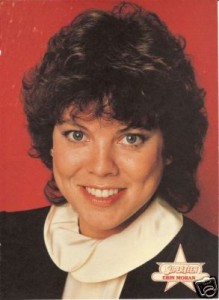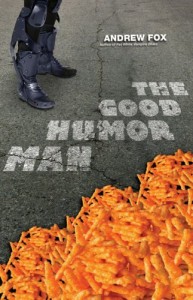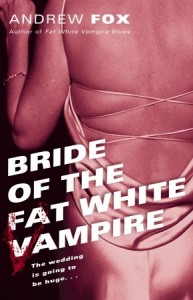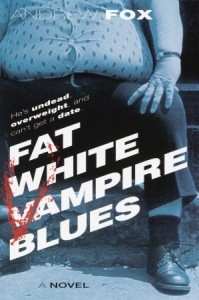I don’t generally go in for the commonplace Schadenfreude of lapping up accounts of celebrities’ falls from grace, either into alcoholism, drug abuse, crime, poverty, or gross obesity (well, okay, you’ve got me on that last one… I simply can’t pass up a good National Enquirer spread on the spreading middles, thighs, and bottoms of the formerly stick-thin celebrity class; but that’s just one of my little things, as any reader of Fat White Vampire Blues would recognize). I’ve mostly avoided following the saga of Charlie Sheen’s meltdowns, and the Winona Ryders (shoplifting), Hugh Grants (hookers), Mel Gibsons (alcoholism, girlfriend abuse, anti-Semitism), and Mackenzie Phillipses (the kitchen sink) of the world don’t tend to grab my interest (unless they get fat).
However, a couple of days ago, one such story of a former celebrity’s descent from the heights to a supposed hell did catch my eye (and it had nothing to do with significant weight gain). The New York Post’s somewhat infamous Page Six picked up on a National Enquirer story about one of the stars of the hit 1970s and 1980s sitcom Happy Days:
“These are not ‘Happy Days’ for Joanie Cunningham actress Erin Moran.
“She’s broke, living in an Indiana trailer park and looking haggard well beyond her 51 years, according to the National Enquirer.
“Moran and husband Steve Fleischmann, 45, are reportedly living hand-to-mouth at the Berkshire Pointe Mobile Home Park in New Salisbury, Ind., where they’re said to be caring for his ailing mom.
“It’s a long fall for the actress, best known as Ron Howard’s wisecracking little sister on one of America’s most beloved sitcoms.
“She appeared in 236 episodes of Happy Days between 1974 and 1984 before doing her short-lived spin-off Joanie Loves Chachi.” …
The reason this story caught my eye was that I once knew the mother of one of Erin Moran’s costars on Happy Days. Lynda Goodfriend played Lori Beth Allen, Richie Cunningham’s girlfriend and later his wife on the show. Lynda’s mother, Mrs. Goodfriend, was the school librarian at Thomas Jefferson Junior High, where I attended seventh through ninth grades from 1976 through 1979. Being a book lover (and wanting to stay as far away as possible from members of the school’s large community of thugs and bullies), I spent a lot of time in the library and got to talk with Mrs. Goodfriend quite a bit. Her daughter joined the cast of Happy Days in 1977, when I was in eighth grade. Mrs. Goodfriend spoke with enormous pride about her daughter, not so much because she had joined the cast of TV’s most popular sitcom, but because she had managed to beat the odds – she was making a living from the arts, a field where so many thousands strived but so few earned any money at all. I’ll always be grateful to Mrs. Goodfriend, who lived up to her name for me and provided a safe haven at a school where I felt hunted and harassed.
So that’s why I bothered clicking on the link to the story about Erin Moran. But there was more to the story than the typical “actress gets older, falls from favor, can’t find work, loses home in foreclosure, ends up living in a trailer park” narrative. There was this:
“Despite these tough times, pals admire Moran’s dedication to her sick mother-in-law.
“’She and Steve moved in with his ailing mother at the trailer park a few weeks back. Erin is like an angel to her mother-in-law. She cooks and cleans for her and takes care of her personal hygiene,’ the family pal observed.”
The story goes on, in tabloid fashion, to obsess on Erin Moran’s prematurely aged appearance and the great gap in her lifestyles between her pinnacle as the young star of a hit TV sitcom and her supposed nadir in the trailer park. It doesn’t quote a word from Erin Moran herself.
And that made me wonder: what if Erin Moran is happy doing what she’s doing now? What if she finds caring for her ailing mother-in-law rewarding? Perhaps the writer didn’t obtain any quotes from Erin herself because what she would have said would have ruined the story’s conventional narrative?
I worked fifteen years for the Louisiana Office of Public Health. One of the administrative assistants in my office was an older woman named Mary. She had worked for the State of Louisiana for more than thirty-five years. When I met her, she was in her fifties, but she looked a good fifteen to twenty years older. She was gruff and initially off-putting, but she had a wicked sense of humor, and she got to be one of my favorite coworkers (she was very popular in the office, always helpful and cheerful). After having worked with her for a few years, she shared a little bit about her personal life with me. She had lost her husband a number of years before, and virtually all of her time at home was taken up with caring for her son, who was both mentally retarded and profoundly handicapped, confined to either bed or a wheelchair. She never complained about this; the stories she chose to share were about the laughs she shared with her son and the ways he found to show his love for her.
I remember, as a young guy in my mid-twenties, feeling sorry for her. Her life seemed to me to be a cage that she couldn’t escape. I thought she’d been dealt a truly devastating hand of cards. I admired her toughness, though, and wondered if I’d ever be able to show the same strength and resilience in a similar situation.
From the perspective of an older, more experienced person, now I can see that Mary had a choice of how to view herself, and I suspect her choice made all the difference for her. She could have chosen to see herself as a victim of fate and circumstances. Had she done so, she would have been a much different woman than the one I and my other coworkers knew; she probably would have become an alcoholic or perhaps a suicide. However, Mary was a religious woman, a Catholic. I believe she chose to see herself as a vessel of God’s loving-kindness, and she chose to focus on whatever evidence she could see of God’s design in the relationship between herself and her son. Yes, her life was hard; one look at the wrinkles on her face told you that. But she plumbed meaning from her life’s hardships and treasured the smallest glints of joy her son could provide. That sustained her.
Our culture used to routinely celebrate people like Mary and the quotidian sacrifices they made. Now I’m afraid we tend to view them more as unfortunates, as victims, as people to be pitied and perhaps assisted through expansions of government programs.
I wonder whether Erin Moran, former TV star, is a woman like my old coworker Mary. If she is, there is a far, far richer story there for a journalist to tell than the “rise and fall” celebrity narrative we’ve come to know so well.
But I suppose that kind of a story wouldn’t be appropriate for Page Six.






Well said.
Thanks, Mark! I hope you and your family are doing great. Please give them my best.